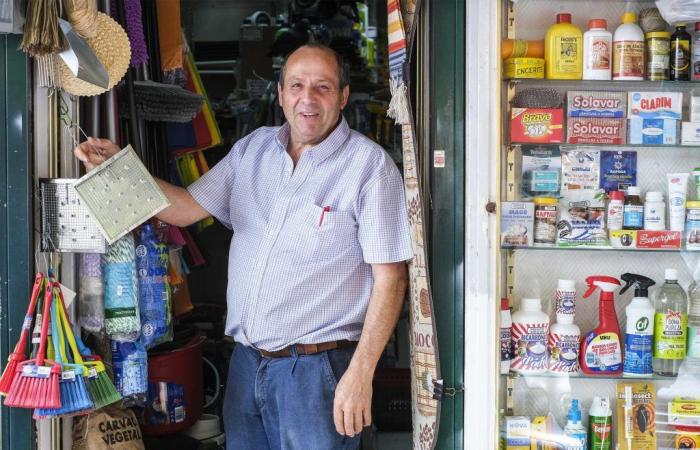In fact, much of the clientele is made up of the elderly population, who still reside in the city. “Our clientele is older. This is the type of customer who still worries about talking to the counter employeeask him for suggestions. We have many customers who have been loyal since the store opened”says Sérgio Fernandes, 47 years old, one of the partners at Mercado da Morais Soares, a small market where there is a butcher’s section, fruit shop, delicatessen and coffee shop.
The business is being maintained “with a lot of effort. And also with many hours of work. If it weren’t like this, due to the offers available in large supermarkets, we would be completely crushed”.
In Alcântara we found the Pensamento do Mar fishmonger. Another rarity, at a time when most fish is sold in hypermarkets and supermarkets or in squares. “We have all types of clientele, from all social classes, and all customers are important”, says Tânia Antunes, 35 years old, who has always been a fishmonger. “I’ve been working with fish for 20 years, I started with my aunt who sold at the Quinta do Conde market. [Sesimbra].
Back to the clientele, the fishmonger explains that, in addition to the elderly, “We have younger people, those who don’t know how to eat fish and come with a lot of curiosity to eat fish. We, on this side, are also here to teach and advise. Fish is not just for cooking, grilling and frying, there are many ways to cook it”, says Tânia, who has sardines as her favorite fish. This is, in fact, the best-selling product, “when it’s in season”.
In this same parish of Lisbon is the Central Alcântara butcher shop. Business is going well here and the store has nine employees., to handle over-the-counter sales but also take-out orders. “We live well with this business, in fact I have another butcher shop, in Largo do Calvário, also here in Alcântara”, reveals Henrique Machado, 50 years old, the owner of the business.
To reach this successful position, Henrique started working at a very young age. “I came to butchers when I was 13 years old. I learned to be a cutter. At the age of 25 I bought my butchers. When I was younger I wanted to earn something and then have a business.”
The secret to success seems simple. “We try to have more quality and personalized service. It’s very different from a supermarket”, warn. “We explain to the customer what is best, we have the [carnes prontas a cozinhar, já temperadas] for younger people who don’t have as much desire to cook, and we explain how to prepare the meat”, says Henrique Machado who, at his table, prefers “beef, which has to be fatty, and pork”.
Also in Henrique’s butchers The bulk of the clientele “are older people, many who live close to the butchers. But we also have other customers, we make deliveries.”
Just cross the street to enter the Maçãs de Adão fruit shop. The sweet aroma of fruit spreads through the air, in a well-organized and colorful store. “This trade is not very easy now because of the competition. Basically on every corner there is a food store. It’s good for the consumer, but for those who are responsible for paying the bills at the end of the month, it’s not easy”, laments Luís Alves, 59 years old, one of the partners.
Luís inherited his share of his father’s fruit shop, now deceased. And he points out the advantages of traditional commerce. “It is likely that there will be some cheaper things in the hypermarket, but here the service is personalized: we already know what each customer wants, which apples they like”he argues.
Furthermore, it adds: “We have some products that hypermarkets cannot have, from small producers, with high quality, with whom we have had partnerships for many years. These are people who have some strawberries from that place, which are very good, and which they will never sell to hypermarkets because they don’t have a large quantity”.
The fruit store partner also explains how purchases are made for the store, ensuring better quality. “We go to the market and we select the flower of the fruits. A hypermarket has to buy ten pallets of cherries for the purchasing center and then distribute them to the stores. We saw ten pallets there and chose, among them, the best ten boxes of cherries to bring to the store. Consumers may pay a little more, but those who like quality know they can find it here.”
From Alcântara the DN goes to Bairro Alto. It is in the heart of this historic district of the city, famous for its nightlife, that We found one of the rare grocery stores run by a Portuguese person. Today, remember, these businesses are in the hands, above all, of Asian immigrants. “I have all. From milk to flour, white sugar, playdough, chicken soup, preserves at an affordable price. Then I also have the more touristy part”, explains Júlio da Silva, 54 years old, owner of Mercearia do Pai Júlio, on Rua do Diário de Notícias.
Imitating ancient times, the grocery store has added tables and also serves wine and snacks. “I copied what was going on in the 80s. I still have everything from groceries, cans of beans, sausages and milk. Then I have the tavern with savory snacks, tapas, open preserves, wine by the glass, imperial. And we work a little with tourism. It’s the only way to survive here, in this part of the city, where there is more tourism”, concludes the grocer.
Tags: Traditional commerce survives Lisbon Carlos Moedas priority
--





